We are living in a very complicated time due to the pandemic caused by a coronavirus that spreads easily and for which vaccination is just beginning
This pandemic is affecting not only health but also the economy and way of life and has led us to the so-called “new normal.”
Even though the infectious outbreak was detected in China a few months ago and turned first into an epidemic and then into a pandemic, there is still relatively little, and sometimes contradictory, data on the spread of the virus, preventive measures, and the most effective and safest treatments.
It is also not known exactly how the coronavirus interferes in the development of other chronic diseases such as sinusitis.
However, it is a fact that COVD-19 has had, and still has, a negative impact on the diagnosis, follow-up, and treatment of patients with sinusitis, since it has reduced the number of visits to specialists and, consequently, the number of complementary tests (especially endoscopies and CT scans) and surgical interventions.
Since COVID-19 is an infectious disease causing respiratory illness, with symptoms such as anosmia (loss of smell), cough, fever, and, in more severe cases, difficulty breathing, it further complicates the differential diagnosis with other diseases of the upper respiratory tract such as sinusitis itself, the common cold and the flu.
So how do I know if I may have COVID-19?
One of the symptoms of coronavirus infection that have been gaining importance in guiding the diagnosis towards COVID-19 is the loss of smell (anosmia) suffered by around 70% of those infected.
Other common symptoms of COVID-19 are fever, dry cough, and tiredness. These symptoms are usually mild and start gradually.
Less common symptoms of coronavirus infection that can aid in the diagnosis are muscle aches and pains, headache, conjunctivitis, sore throat, diarrhea, and skin rashes or discoloration of the fingers or toes.
Nasal congestion and the nasal discharge guide the diagnosis toward the common cold or sinusitis. You should know that a cold that lasts more than 10 days is called acute post-viral sinusitis.
If you have chronic sinusitis and suddenly lose your sense of smell without a stuffy or runny nose, you should go for COVID tests.
The table shows the symptoms and signs that help the differential diagnosis between COVID and sinusitis.
| SYMPTOMS | COVID-19 | SINUSITIS |
| Fever | Possible | In bacterial superinfections |
| Cough | Dry, no mucus | With mucus |
| Anosmia (loss of smell) | YES (70% cases) | YES |
| Headache | YES | YES |
| Nasal congestion | Infrequent | YES |
| Runny nose | Infrequent | YES |
| Sneezing | No | YES |
| Throat pain | Possible | Possible |
| Shortness of breath | Si | In severe cases |
| Shaking chills | Si | No |
| Conjunctivitis | Possible | No |
| Diarrhea | Possible | No |
| Facial pain | No | YES |
| Halitosis (bad breath) | No | Possible |
| Impaired vision | No | In severe cases |
Another question that arises about COVID-19 is whether it can cause sinusitis.
COVID-19 can cause sinusitis?
Since this coronavirus causes an infection of the respiratory tract, it may affect the upper respiratory tract (sinuses, nose, and throat) and could encourage the appearance of sinusitis, but there is a lack of information on whether COVID-19 causes sinusitis.
Interestingly, Dr. Claire Hopkins, a British Ear, Nose & Throat specialist at Guy’s Hospital and President of the British Rhinological Society, stated at a recent roundtable that the percentage of people with chronic sinusitis with polyps and/or asthma among those admitted and those who have died from COVID is lower than in the general population. However, it is unknown if these conditions prevent coronavirus infection or whether this lower figure is because this group of people has followed hygiene measures more strictly.
In conclusion, from this article, Dr. Hopkins’ recommendations on COVID for people with sinusitis are as follows:
- Wear the mask
- Wash your hands periodically
- Do not abandon treatment
- If your symptoms get worse (severe headache, swelling and redness around the eyes, high fever, and/or impaired vision), see a doctor.
Our recommendation if you suffer from acute or chronic sinusitis:
It is easy to deduce that if the symptoms are due to the accumulation of mucus, relief will be obtained by eliminating that mucus. But what seems so simple in practice is not, and the proof is that sinusitis sufferers combine an average of 3 products or medications each time they have an exacerbation without achieving complete resolution of the symptoms.
Effective, and scientifically proven natural treatment for sinusitis.
To achieve this, it is necessary to use natural sinusitis treatments that restore the function of the sinuses and remove the mucus that is trapped inside them.
This is precisely what Nasodren® does with its unique mechanism of action that opens the orifices of the sinuses that have closed due to inflammation, restores the function of the cilia, and increases the production of clear mucus, allowing the thick mucus that has accumulated in the sinuses to drain away.
Nasodren® is a natural treatment for sinusitis that contains only cyclamen extract, without excipients or preservatives, and does not cause a rebound effect, tolerance or dependence.
Nasodren is 100% natural, with no rebound efect
Effectively reduces nasal congestion
Buy now HERE
